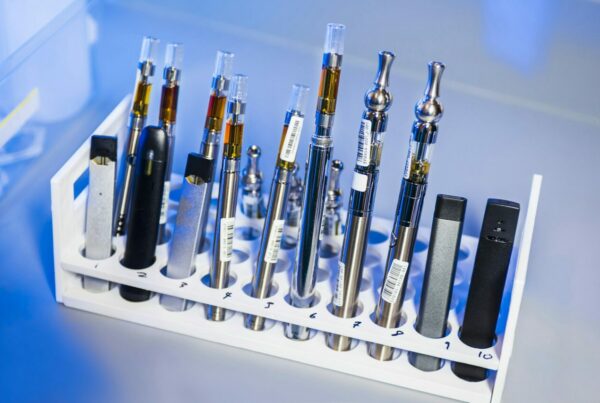N, N-Dimethyltryptamine (DMT) is a compound commonly found in various plants and animals, known for its intense yet brief psychedelic effects when ingested.
Increasing research supports the idea that DMT, which naturally occurs in the body, plays crucial roles in the peripheral and central nervous systems and might function as a neurotransmitter.
DMT can trigger strong psychedelic effects, but typically does not cause many negative reactions, apart from potential cardiovascular complications when administered in large quantities via injection.
Let’s explore DMT and its diverse roles. These roles range from recreational use to its promising potential in scientific research and therapeutic applications.

A Brief Introduction to DMT: What is it?
| Characteristic | Information |
| Name | N, N-Dimethyltryptamine (DMT) |
| Classification | Indole alkaloid |
| Occurrence | Naturally found in a variety of plants and animals |
| Psychoactive Effects | Induces brief, intense psychedelic experiences when ingested. |
| Method of Consumption | Can be smoked, injected, or taken orally. |
| Duration of Effects | Short duration, typically lasting from 5 to 30 minutes. |
| Chemical Structure | Comprises a tryptamine core with two methyl groups attached to the amine nitrogen atom. |
| Metabolism | Rapidly metabolized by the body, broken down by monoamine oxidase (MAO). |
| Cultural Use | Historically used in various ceremonial and shamanic rituals by indigenous cultures. |
| Other names | Dimitri, Fantasia, Businessman’s trip, Businessman’s special, 45-minute psychosis, Spiritual molecule |
The Role of DMT in Mental Health
N, N-Dimethyltryptamine (DMT), a substance famous for its potent psychedelic effects, is gaining attention for its potential benefits in mental health. Despite its usual association with intense hallucinatory experiences, recent studies suggest a connection between DMT and mental wellness.
Effects on Psychological and Emotional Health and Well-being
The psychedelic properties of DMT are renowned for eliciting strong emotional reactions and altering states of consciousness. This could potentially pave the way for therapeutic methodologies to address mental health concerns, aid in emotional processing, and offer new perspectives on personal traumas.
Neuroplasticity and Cognitive Function
Research suggests that DMT may influence neuroplasticity, thereby enhancing the brain’s ability to adapt and reconfigure itself. Its potential impact on synaptic plasticity and neural connectivity could offer promising treatments for disorders linked to neural maladaptation.
Potential Therapeutic Applications for Mental Health Disorders
Initial studies underscore DMT’s potential in treating disorders such as depression, addiction, and PTSD. Its ability to induce mystical or spiritual experiences could provide a novel approach to psychotherapy and aid in restructuring negative thought processes.
Exploring the natural presence of DMT within the human body demonstrates its role in mental health resilience, stress management, and overall psychological well-being. Understanding how the body manages its internal DMT levels could lead to the development of innovative therapeutic strategies.
DMT’s Role in Mental Health Disorders
| Mental Health Disorder | Definition | DMT’s Potential Efficacy | Advantages |
| Depression | Defined by a mood disorder involving persistent sadness, apathy, and reduced motivation | Preliminary research suggests DMT could alleviate symptoms by inducing deeply emotional experiences. | Its rapid onset and ability to provoke transformative experiences could offer novel therapeutic techniques for restructuring negative thought patterns and enhancing emotional processing |
| Post-Traumatic Stress Disorder (PTSD) | A mental health condition triggered by traumatic events, resulting in flashbacks, extreme anxiety, and intrusive thoughts | Early studies point towards DMT’s potential to manage symptoms by inducing spiritual or mystical experiences that could help patients reframe traumatic memories | DMT’s potential to induce altered states of consciousness could play a role in facilitating emotional processing and providing a fresh perspective on traumatic experiences |
| Addiction | A complex disorder characterized by compulsive engagement in rewarding stimuli despite adverse consequences | Certain studies suggest DMT’s potential in disrupting addictive patterns and reducing substance cravings | DMT’s potential to provoke intense and transformative experiences could aid individuals in modifying their behavioural patterns and tackling their underlying triggers of their addiction |
Approach to Using DMT
DMT, renowned for causing short yet powerful psychedelic experiences, can be utilized in various ways. The selection of administration method typically depends on the desired intensity and length of the experience.
Smoking:
When DMT is smoked in a pipe or vaporized, precise temperature control is necessary to avoid overheating and burning the compound. The psychedelic experience usually begins instantly when DMT is smoked, generally lasting between 5 to 15 minutes.
Oral Intake:
DMT, when taken orally, leads to slower onset effects that can last for several hours. This is because DMT breaks down more slowly when combined with an MAOI.
Injection:
DMT can be directly injected into the bloodstream for fast and strong effects.
This method results in an instantaneous and powerful experience, but it requires precise dosage and carries higher risks.
Insufflation (Snorting):
Snorting DMT results in a slower onset of effects compared to smoking but may provide a more prolonged experience.
Sublingual or Buccal Administration:
When DMT is absorbed through the oral mucosa, this method provides an alternative to smoking and offers a longer, albeit less intense, experience.
Determining Therapeutic Dosage: N, N-Dimethyltryptamine (DMT)
For smoking, the suggested dosage lies between 20 to 40 mg, while for intravenous administration, the recommended dosage is 0.2 to 0.4 mg per kg of body weight. These dosage guidelines are primarily relevant to clinical research and are particularly applicable for intravenous use.
- Larger doses given intravenously are associated with intense visuals, temporary loss of control, and a mixed state of anxiety and euphoria
- Fascinatingly, lower doses have exhibited less desirable effects
- Recreational doses of smoked DMT usually vary from 40 to 50 mg, occasionally even reaching up to 100 mg
- Various doses of intravenous People who have had near-death experiences related to DMT (7, 14, 18, and 20 mg solutions) have reported significant and long-lasting enhancements in their psychological health.
Availability of DMT
ProductsOsmosis – 4-ACO-DMT Ethereal Essence Tincture
This tincture, marketed as containing 4-Acetoxy-N, N-dimethyltryptamine (4-AcO-DMT), a type of DMT, is a liquid extract meant for oral intake. This particular product might offer a distinct experience compared to traditional DMT.
Lucid Supply Co. – 5-MeO DMT Vaporizer
This product is a vaporizer that delivers 5-Methoxy-N, N-dimethyltryptamine (5-MeO-DMT), renowned for its intense, transformative, and often short-lived experiences, with 5-MeO-DMT as its active component.
Integral Alchemist – Acacia – 1ml DMT Vape Cartridge
The Integral Alchemist’s DMT vape cartridge is pre-filled with N, N-Dimethyltryptamine. This product is likely aimed at those who favor a discreet and convenient way of consuming DMT.
Deadhead Chemist – 5-Meo-DMT Cartridge
This cartridge contains 5-Methoxy-N, N-dimethyltryptamine (5-MeO-DMT), a substance known for its deep and powerful impacts.
There may be potential mental health benefits linked to personal growth, spiritual experiences, and therapeutic applications aimed at enhancing emotional well-being.
Deadhead Chemist – N, N DMT Cartridge
Another offering from Deadhead Chemist, this cartridge houses the traditional N, N-Dimethyltryptamine. Cartridges provide a user-friendly way of ingesting DMT, ensuring a more consistent and controlled experience.
Concluding Remarks
The application of N, N-Dimethyltryptamine (DMT) in
How can one acquire DMT products safely and responsibly?
Reliable sources like the Shroom Gummies Canada Online Dispensary can provide guidance and a wide selection of DMT products for those interested in exploring responsibly.
Mental health therapy offers a fascinating and complex journey. The ability of certain compounds to instigate powerful but transient psychedelic experiences opens up innovative therapeutic avenues.Initial studies indicate its possible role in emotional processing, personal growth, and potentially
Mental health treatment’s substantial influence underscores the need for careful consideration and responsible usage.
For those keen to explore DMT products safely, trustworthy sources like Shroom Gummies Canada Online Dispensary can provide guidance and a variety of options.
Frequently Asked Questions:
What are the differences between various DMT products’ effects on mental health?
For instance, vaporizers might yield immediate effects, whereas tinctures or vape cartridges could provide more controlled and consistent doses.
Including related compounds or 5-MeO-DMT may result in varying intensities and different types of mental health effects.
These nuanced differences underscore the importance of selecting a DMT product based on individual needs and mental health goals.
Can DMT lead to enduring changes in mental health and personal growth?
Anecdotal evidence suggests that DMT-induced experiences could have persistent effects on mental health and personal development.
Profound or transformative experiences, such as those resembling near-death experiences, are often associated with reports of continuous positive changes in psychological health and personal advancement.
While these experiences are intense and ephemeral, they frequently lead to introspection, spiritual revelations, and a sense of unity or enlightenment.
Users often report a refreshed perspective on life, improved emotional resilience, and a heightened sense of life appreciation following these experiences.
What’s the optimal strategy for using DMT for mental health purposes?
Making informed decisions, which encompass thorough research and understanding of the compound’s effects, is essential.
Advice from mental health experts or experienced users can provide valuable insights into potential risks and benefits.
Understanding personal tolerance and mental preparedness is also crucial, as well as creating a supportive and safe environment for the experience.
How does DMT stack up against other psychedelic therapies such as psilocybin or LSD in mental health treatment?
DMT’s effects, duration, and intensity vary from other psychedelics like psilocybin or LSD. It has a shorter duration.
High-intensity, short-acting psychedelics like DMT offer unique experiences that require distinct therapeutic approaches in mental health, separate from those applied to longer-lasting psychedelics.
Recommended Additional Reading:

 click here." style="display: none;" />
click here." style="display: none;" />



